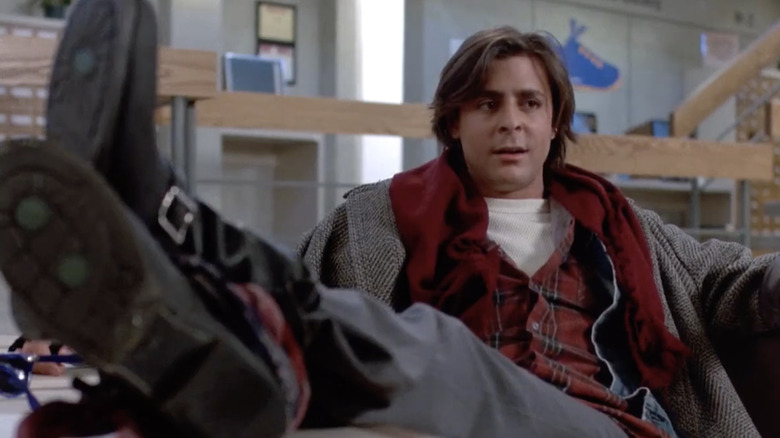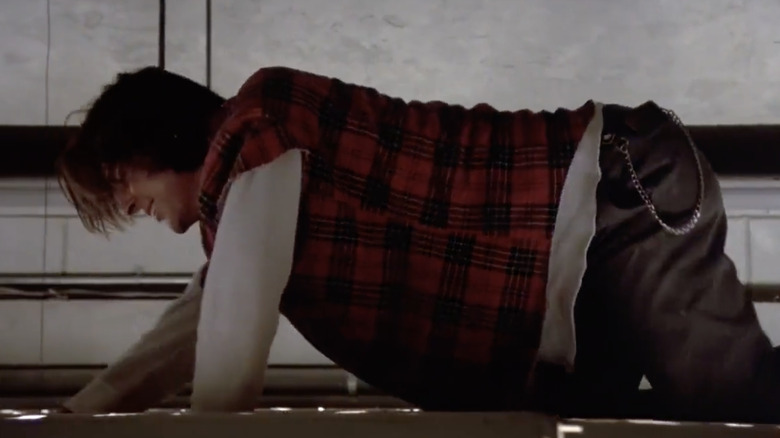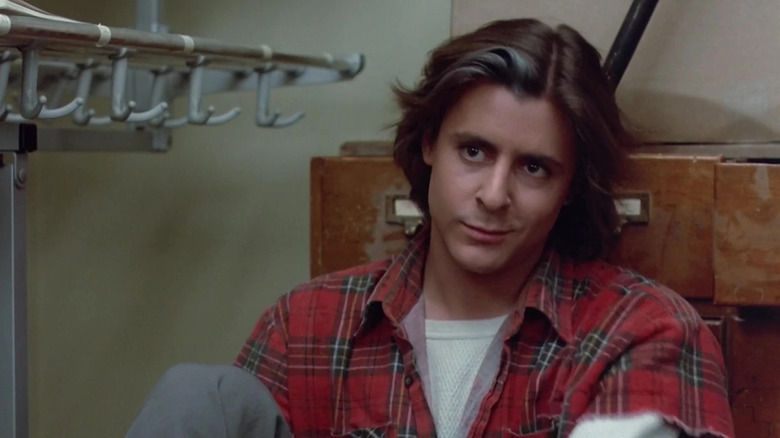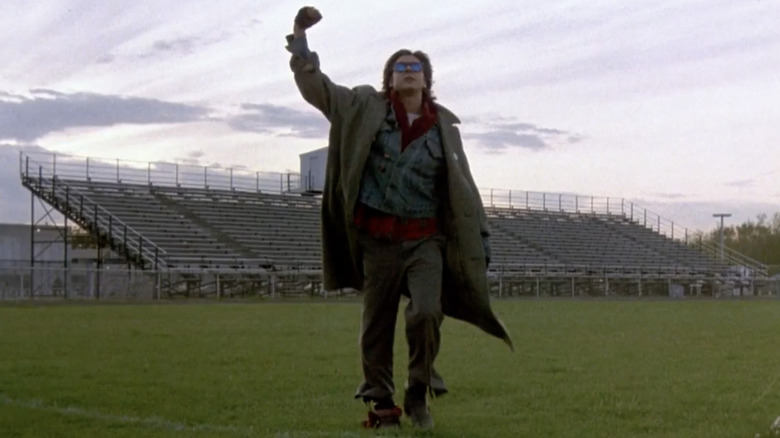Judd Nelson's Method Acting In The Breakfast Club Almost Got Him Fired
"The Breakfast Club" is the story of five teenagers, each representing a high school stereotype: a brain, an athlete, a basketcase, a princess, and a criminal. They are all thrown together for a long day of Saturday detention, where they find out that maybe they aren't so different after all.
It's classic John Hughes 1980s teenage tropes, and I am such a sucker for his movies ... and for John Bender.
Bender is one of my favorite bad boys. At first glance, he more than lives up to his criminal archetype. Unlike the other characters, he's right at home in detention, sauntering into the library full of sarcasm, swagger, and self-destruction. From the beginning of the film, he makes it his personal mission to antagonize every single person around him in the harshest way possible. And he's good at it.
As we learn more about Bender and his life, we begin to understand why he behaves this way, and that the hard exterior is a defense mechanism that helps him cope with his less than desirable home life. Underneath all the bravado is a sad, lonely, traumatized teenager doing the best he can with what he's got.
Bender is a complicated character because he isn't a good guy. Throughout the film, he sexually harasses the school princess, Claire (Molly Ringwald), threatens the jock, Andrew (Emilio Estevez), with a knife, and constantly ridicules the vulnerable brain, Brian (Anthony Michael Hall). Yet, we still cheer when he gets the girl, and we smile at his triumphant freeze-frame of a fist pump at the end. Despite his flaws, and there are a lot of them, we like him.
However, the actor behind the character, Judd Nelson, wasn't always everyone's favorite behind the scenes of the production, and his performance tactics almost got him fired when he went full Bender.
Casting Bender in The Breakfast Club
In Susannah Gora's book, "You Couldn't Ignore me if You Tried," Casting director Jackie Burch recalls the struggle she experienced casting Bender:
"I had seen everybody in L.A. I knew what the part had to be: the antithesis of all those other kids. And he had to be naturally a street kid, and that's not easy to find in L.A., and even in New York, I had trouble."
Nicolas Cage and John Cusack both read for the role, and Cusack wanted it badly. But Burch thought he was "totally wrong" for the part. He'd find his calling with a boombox a few years later.
According to Gora, Nelson had previously read for Bender in New York and impressed Burch and director John Hughes, so they had him come to L.A. for another audition. This time, Nelson had perfected the character's image and wore an outfit very similar to the one we see in the movie. Along with the look, Nelson had also taken on Bender's hostile personality.
Nelson explained in Gora's book that he found Bender's attitude moments before his L.A. audition:
"There was this little outdoor area where I [was] waiting to go in and read. I [had] a tennis ball and I [was] throwing it against the wall, with this [walkman] blasting about as loud as it [would] go ... I [got] this tap ... someone [told] me, 'you gotta calm down.' I [said,] 'What?' He [said,] 'You're throwing [that] ball too loud,' and I [said,] 'WHAT?!' And I [walked] around a bit, and smok[ed] a cigarette."
It was this brush with authority that helped the actor find the character's rebellious nature.
By the time, Nelson was called to read with the other actors, he had become Bender. He walked into the audition room, threw his Walkman on the floor, and left the music blasting as he read for the role.
Ally Sheedy remembers what she felt watching Nelson audition:
"He [was] very graceful, and beautiful, and he [was] very dark. Not just in the way he look[ed], in the way he [was] ... I was really kind of dazzled by him. He [was] so unpredictable. He did not stick to anything John wrote in the audition ... he went off on his own riff. He went all over the place, and John loved it."
Until Nelson aimed his attitude at Hughes' muse, Molly Ringwald.
'Being bad feels pretty good'
In reality, Judd Nelson was nothing like bad boy Bender. He was born to two Harvard-educated, well-to-do parents, attended a swanky prep school, and studied philosophy at one of the nation's top liberal art colleges, Haverford College. He dropped out of Haverford to attend The Stella Adler Conservatory, where he studied acting full time. The methods he learned here would be both a blessing and a curse for Hughes.
Nelson took acting seriously, preferring the method approach, where actors never break character on set. So during the filming of "The Breakfast Club," the privileged son of Harvard alums became an out-of-control bully. Hughes loved this approach during Nelson's audition but grew tired of the actor's antics on set.
Throughout the movie, Claire receives the worst of Bender's attacks, which meant Nelson often targeted Ringwald on set. Before "The Breakfast Club," Hughes and Ringwald had previously worked together on "Sixteen Candles," and developed a special bond that would last for years, so Nelson's taunting of Ringwald didn't go over well with the director.
Ringwald recalled Nelson's behavior towards her, but unlike Hughes, she didn't take it personally:
"I am not a method actor, but I could see it was so clearly what [Nelson] was doing that I think I was just sort of rolling my eyes ... It really did upset John ... He was incredibly protective of me ... I have never, ever seen him so angry. He was really irate."
Hughes was so irate that he wanted to fire Nelson, but Ringwald and the rest of the case talked Hughes out of it:
" ... Everybody sort of rallied together – myself included – and pleaded with John not to fire him ... I really wanted Judd in that part. There was nobody who got that part the way he did."
Hughes listened to his cast and kept Nelson in the role.
Leader of the brat pack
"The Breakfast Club" was released in 1985 and received mostly positive reviews. Sure, some critics rolled their eyes at Hughes' overdramatization of teen angst, while others thought he perfectly captured the lost and overwhelming sensation of adolescence in ways other teen films had not. Despite certain takes on the movie, a few well-known critics praised Nelson's performance.
In his review of the film, Roger Ebert called Bender "the strong center of the film," and Gene Siskel's review complimented Nelson for "effectively turning a boor into a tragic character."
Critics may have been right about Hughes. His films do lean towards the melodramatic, but so do a lot of teenagers, which is probably why his characters feel so authentic. Hughes' greatest strength was knowing how to write the voices of young adults and when to listen to them.



